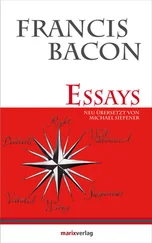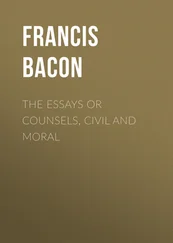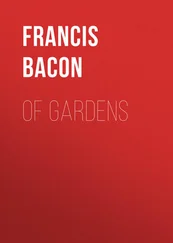Francis Bacon - The Essays
Здесь есть возможность читать онлайн «Francis Bacon - The Essays» — ознакомительный отрывок электронной книги совершенно бесплатно, а после прочтения отрывка купить полную версию. В некоторых случаях можно слушать аудио, скачать через торрент в формате fb2 и присутствует краткое содержание. Год выпуска: 0101, Жанр: foreign_antique, foreign_prose, на английском языке. Описание произведения, (предисловие) а так же отзывы посетителей доступны на портале библиотеки ЛибКат.
- Название:The Essays
- Автор:
- Жанр:
- Год:0101
- ISBN:нет данных
- Рейтинг книги:5 / 5. Голосов: 1
-
Избранное:Добавить в избранное
- Отзывы:
-
Ваша оценка:
- 100
- 1
- 2
- 3
- 4
- 5
The Essays: краткое содержание, описание и аннотация
Предлагаем к чтению аннотацию, описание, краткое содержание или предисловие (зависит от того, что написал сам автор книги «The Essays»). Если вы не нашли необходимую информацию о книге — напишите в комментариях, мы постараемся отыскать её.
The Essays — читать онлайн ознакомительный отрывок
Ниже представлен текст книги, разбитый по страницам. Система сохранения места последней прочитанной страницы, позволяет с удобством читать онлайн бесплатно книгу «The Essays», без необходимости каждый раз заново искать на чём Вы остановились. Поставьте закладку, и сможете в любой момент перейти на страницу, на которой закончили чтение.
Интервал:
Закладка:
First, therefore, I say you cannot have a perfect palace except you have two several sides; a side for the banquet, as it is spoken of in the book of Hester, and a side for the household; the one for feasts and triumphs, and the other for dwelling. I understand both these sides to be not only returns, but parts of the front; and to be uniform without, though severally partitioned within; and to be on both sides of a great and stately tower, in the midst of the front, that, as it were, joineth them together on either hand. I would have on the side of the banquet, in front, one only goodly room above stairs, of some forty foot high; and under it a room for a dressing, or preparing place, at times of triumphs. On the other side, which is the household side, I wish it divided at the first, into a hall and a chapel (with a partition between); both of good state and bigness; and those not to go all the length, but to have at the further end, a winter and a summer parlor, both fair. And under these rooms, a fair and large cellar, sunk under ground; and likewise some privy kitchens, with butteries and pantries, and the like. As for the tower, I would have it two stories, of eighteen foot high apiece, above the two wings; and a goodly leads upon the top, railed with statuas interposed; and the same tower to be divided into rooms, as shall be thought fit. The stairs likewise to the upper rooms, let them be upon a fair open newel, and finely railed in, with images of wood, cast into a brass color; and a very fair landing-place at the top. But this to be, if you do not point any of the lower rooms, for a dining place of servants. For otherwise, you shall have the servants' dinner after your own: for the steam of it, will come up as in a tunnel. And so much for the front. Only I understand the height of the first stairs to be sixteen foot, which is the height of the lower room.
Beyond this front, is there to be a fair court, but three sides of it, of a far lower building than the front. And in all the four corners of that court, fair staircases, cast into turrets, on the outside, and not within the row of buildings themselves. But those towers, are not to be of the height of the front, but rather proportionable to the lower building. Let the court not be paved, for that striketh up a great heat in summer, and much cold in winter. But only some side alleys, with a cross, and the quarters to graze, being kept shorn, but not too near shorn. The row of return on the banquet side, let it be all stately galleries: in which galleries let there be three, or five, fine cupolas in the length of it, placed at equal distance; and fine colored windows of several works. On the household side, chambers of presence and ordinary entertainments, with some bed-chambers; and let all three sides be a double house, without thorough lights on the sides, that you may have rooms from the sun, both for forenoon and afternoon. Cast it also, that you may have rooms, both for summer and winter; shady for summer, and warm for winter. You shall have sometimes fair houses so full of glass, that one cannot tell where to become, to be out of the sun or cold. For inbowed windows, I hold them of good use (in cities, indeed, upright do better, in respect of the uniformity towards the street); for they be pretty retiring places for conference; and besides, they keep both the wind and sun off; for that which would strike almost through the room, doth scarce pass the window. But let them be but few, four in the court, on the sides only.
Beyond this court, let there be an inward court, of the same square and height; which is to be environed with the garden on all sides; and in the inside, cloistered on all sides, upon decent and beautiful arches, as high as the first story. On the under story, towards the garden, let it be turned to a grotto, or a place of shade, or estivation. And only have opening and windows towards the garden; and be level upon the floor, no whit sunken under ground, to avoid all dampishness. And let there be a fountain, or some fair work of statuas, in the midst of this court; and to be paved as the other court was. These buildings to be for privy lodgings on both sides; and the end for privy galleries. Whereof you must foresee that one of them be for an infirmary, if the prince or any special person should be sick, with chambers, bed-chamber, antecamera, and recamera joining to it. This upon the second story. Upon the ground story, a fair gallery, open, upon pillars; and upon the third story likewise, an open gallery, upon pillars, to take the prospect and freshness of the garden. At both corners of the further side, by way of return, let there be two delicate or rich cabinets, daintily paved, richly hanged, glazed with crystalline glass, and a rich cupola in the midst; and all other elegancy that may be thought upon. In the upper gallery too, I wish that there may be, if the place will yield it, some fountains running in divers places from the wall, with some fine avoidances. And thus much for the model of the palace; save that you must have, before you come to the front, three courts. A green court plain, with a wall about it; a second court of the same, but more garnished, with little turrets, or rather embellishments, upon the wall; and a third court, to make a square with the front, but not to be built, nor yet enclosed with a naked wall, but enclosed with terraces, leaded aloft, and fairly garnished, on the three sides; and cloistered on the inside, with pillars, and not with arches below. As for offices, let them stand at distance, with some low galleries, to pass from them to the palace itself.
Of Ceremonies, And Respects
He that is only real, had need have exceeding great parts of virtue; as the stone had need to be rich, that is set without foil. But if a man mark it well, it is, in praise and commendation of men, as it is in gettings and gains: for the proverb is true, That light gains make heavy purses; for light gains come thick, whereas great, come but now and then. So it is true, that small matters win great commendation, because they are continually in use and in note: whereas the occasion of any great virtue, cometh but on festivals. Therefore it doth much add to a man's reputation, and is (as Queen Isabella said) like perpetual letters commendatory, to have good forms. To attain them, it almost sufficeth not to despise them; for so shall a man observe them in others; and let him trust himself with the rest. For if he labor too much to express them, he shall lose their grace; which is to be natural and unaffected. Some men's behavior is like a verse, wherein every syllable is measured; how can a man comprehend great matters, that breaketh his mind too much, to small observations? Not to use ceremonies at all, is to teach others not to use them again; and so diminisheth respect to himself; especially they be not to be omitted, to strangers and formal natures; but the dwelling upon them, and exalting them above the moon, is not only tedious, but doth diminish the faith and credit of him that speaks. And certainly, there is a kind of conveying, of effectual and imprinting passages amongst compliments, which is of singular use, if a man can hit upon it. Amongst a man's peers, a man shall be sure of familiarity; and therefore it is good, a little to keep state. Amongst a man's inferiors one shall be sure of reverence; and therefore it is good, a little to be familiar. He that is too much in anything, so that he giveth another occasion of satiety, maketh himself cheap. To apply one's self to others, is good; so it be with demonstration, that a man doth it upon regard, and not upon facility. It is a good precept generally, in seconding another, yet to add somewhat of one's own: as if you will grant his opinion, let it be with some distinction; if you will follow his motion, let it be with condition; if you allow his counsel, let it be with alleging further reason. Men had need beware, how they be too perfect in compliments; for be they never so sufficient otherwise, their enviers will be sure to give them that attribute, to the disadvantage of their greater virtues. It is loss also in business, to be too full of respects, or to be curious, in observing times and opportunities. Solomon saith, He that considereth the wind, shall not sow, and he that looketh to the clouds, shall not reap. A wise man will make more opportunities, than he finds. Men's behavior should be, like their apparel, not too strait or point device, but free for exercise or motion.
Читать дальшеИнтервал:
Закладка:
Похожие книги на «The Essays»
Представляем Вашему вниманию похожие книги на «The Essays» списком для выбора. Мы отобрали схожую по названию и смыслу литературу в надежде предоставить читателям больше вариантов отыскать новые, интересные, ещё непрочитанные произведения.
Обсуждение, отзывы о книге «The Essays» и просто собственные мнения читателей. Оставьте ваши комментарии, напишите, что Вы думаете о произведении, его смысле или главных героях. Укажите что конкретно понравилось, а что нет, и почему Вы так считаете.












